Owning a Class A RV is a wonderful way to travel and to enjoy living in a wide array of natural environments. What could be better than those panoramic views on your next road trip? But can anyone drive a Class A RV? Do you need a special Class A RV license?
You might. Let’s check out the rules and regulations surrounding Class As.
- 1) Can You Drive a Class A RV with a Regular Car License?
- 2) Do You Need a Special Class A RV License to Drive an RV?
- 3) What Is a Commercial Driver’s License?
- 4) RV Weight and Driver’s License Requirements
- 5) States That Require a Commercial Driver’s License
- 6) States That Require a Non-Commercial Special Driver’s License
- 7) States That Require Special Driver’s License Endorsements
Can You Drive a Class A RV with a Regular Car License?
Depending on your state of residence and how much your RV weighs, you may be able to drive a Class A RV with a regular car license.
Many states don’t require a special Class A RV license, but others have different rules.
Let’s look at these rules in a little more detail:
Do You Need a Special Class A RV License to Drive an RV?
Probably not, but here’s the deal: Some states have requirements for RVs over 26,000 pounds. Since most Class A RVs weigh less than this, you might not need anything more than a regular driver’s license.
But if your RV weighs more, you may need a commercial driver’s license (CDL) or another special license called a non-commercial driver’s license (NCDL).
What Is a Commercial Driver’s License?
When people think of a commercial driver’s license, they often think of truck drivers, because state laws almost always require truck drivers to have a CDL. Basically, you need a CDL for large vehicles like tractor-trailers, buses, and sometimes RVs. Some people refer to these certifications as “Class A” licenses.
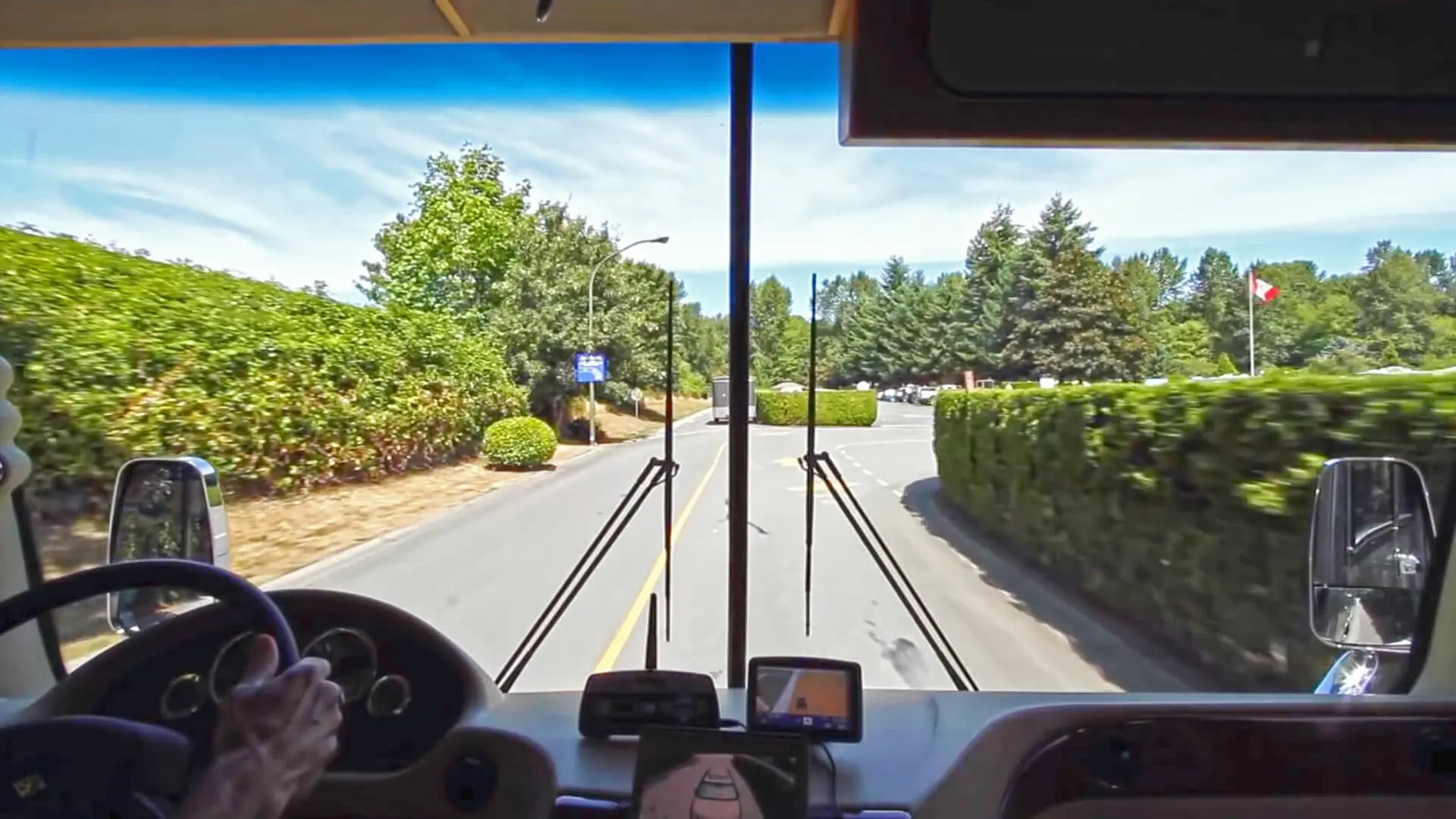
Driving a Class A RV is not the same as driving a car or a van or even a smaller RV. While you may not be required to obtain a special Class A RV license, learning how to safely operate a large vehicle is critical.
You might need a special license merely because a large vehicle can be dangerous in inexperienced hands. Additionally, the larger and heavier your vehicle, the more different it is from driving a car. Another situation that always requires a CDL is driving a bus, which includes the additional responsibility of carrying passengers for hire.
To earn your CDL, you’ll likely need to pass specific classes that teach you how to safely operate such a large vehicle.
RV Weight and Driver’s License Requirements
If your RV, plus the weight of anything you’re towing, exceeds 26,000 pounds, chances are good that you’ll need a specific driver’s license. For some states, you need a CDL. Others require a specialized but non-commercial license.
If you live in a state that requires a CDL or NCDL over a standard driver’s license, you must get the associated special permits. However, you can cross state lines without acquiring the permit required in that state, as the state you live in (or, if you’re a full-timer, the state you’re domiciled in) dictates licensing requirements.
For example, suppose your domicile is in Illinois, and you can therefore drive your large RV with your regular driver’s license. In that case, you might worry about going through Wisconsin, where residents need a CDL to drive an RV over 26,000 pounds. However, law enforcement will honor your state’s laws if you cross borders, and you won’t get a ticket if you don’t have a CDL while passing through Wisconsin.
States That Require a Commercial Driver’s License
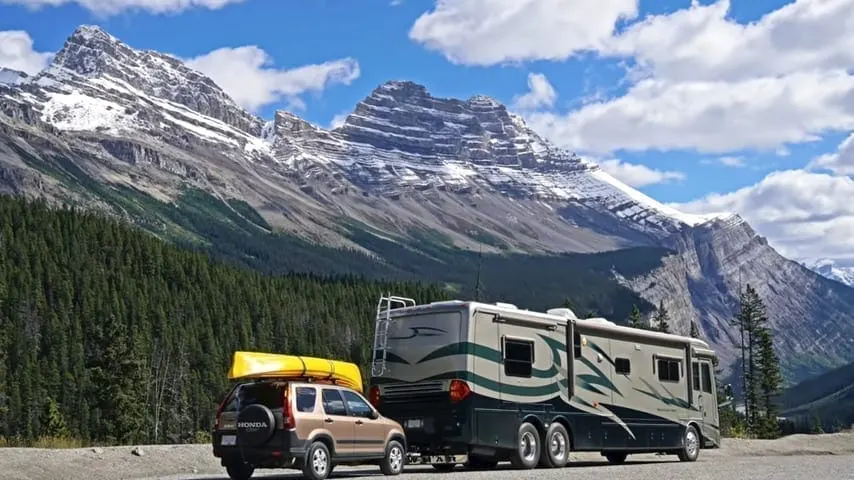
Some states require a special CDL license if you’re towing a vehicle behind your Class A RV or if your RV exceeds a certain weight.
We wanted to give you a quick reference list of all the states that require a CDL for large RVs. Just because you live in one of these states and drive an RV or pull a fifth wheel doesn’t mean you need a CDL. Your situation must meet specific requirements.
You’ll need a CDL in the following states under the following circumstances (keep in mind that laws do change, so be sure to stay up to date on your state’s requirements as they may have changed since we published this post).
Arkansas: Your vehicle weight exceeds 26,000 pounds.
California: You’re towing more than 10,000 pounds.
Connecticut: You have a single vehicle or a combined vehicle/towable weight over 26,000 pounds.
Hawaii: You have a single vehicle or a combined vehicle/towable weight over 26,000 pounds.
Kansas: You have a single vehicle or a combined vehicle/towable weight over 26,000 pounds.
Michigan: Your vehicle weight exceeds 26,000 pounds.
Nevada: You’re towing multiple vehicles that have a combined weight that exceeds 26,000 pounds.
New Mexico: You have a single vehicle or a combined vehicle/towable weight over 26,000 pounds.
New York: Your vehicle weight exceeds 26,000 pounds.
North Carolina: You’re pulling multiple vehicles that have a combined weight that exceeds 26,000 pounds.
South Carolina: You have a single vehicle or a combined vehicle/towable weight over 26,000 pounds.
Washington, D.C.: You have a single vehicle or a combined vehicle/towable weight over 26,000 pounds.
Wisconsin: Your vehicle length exceeds 45 feet.
Wyoming: You have a vehicle that exceeds 26,000 pounds, and you’re towing over 10,000 pounds.
These are the requirements at the time of the writing of this article. Be sure to check your state’s DMV for the most up-to-date information or if you have questions.
States That Require a Non-Commercial Special Driver’s License
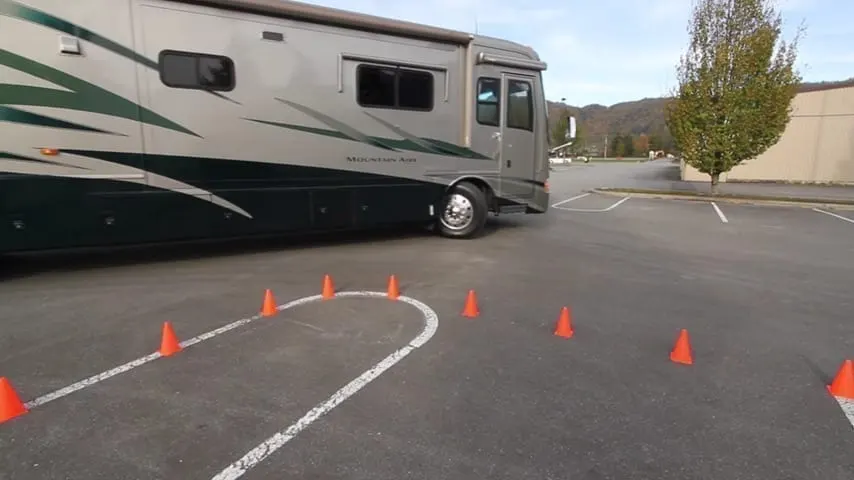
Some states require you to have an NCDL or a Class B license under certain circumstances. Be sure to check the regulations of your home state.
You should also know which states require you to have more than a driver’s license in the form of an NCDL or Class B license.
The following states require you to have an NCDL or Class B license under the following circumstances:
California: Your vehicle is over 26,000 pounds or longer than 40 feet.
Maryland: Your vehicle is over 26,000 pounds.
North Carolina: You have a single vehicle over 26,000 pounds.
Nevada: You need a Class B license for a single vehicle over 26,000 pounds.
Pennsylvania: You need a Class B license for a single vehicle over 26,000 pounds.
Texas: You need a special Class B license for a single, non-commercial vehicle over 26,000 pounds (alone or when towing a vehicle up to 10,000 pounds… but a special Class A license is required for an RV over 26,000 pounds to tow a second vehicle over 10,000 pounds)
Wyoming: You need a Class B license if your vehicle is over 26,000 pounds and you’re towing less than 10,000 pounds.
Again, check the state’s DMV website for information on your domicile state.
States That Require Special Driver’s License Endorsements
You might not need a Class A or Class B license to drive your rig in some states, but you might still need to pass specific endorsements. These are often called Class C licenses.
You’ll need a recreational vehicle or recreational double or “R” endorsement if you’re pulling more than one vehicle. For example, if you’re pulling a fifth wheel and flat-towing your car, you might need an “R” endorsement on your license.
You could also need a “J” endorsement, which usually applies to towing vehicles. Currently, only one state requires a J endorsement under specific circumstances. Here’s a little more information on which states require a special endorsement.
New York: You need a Recreational Vehicle “R” endorsement if your vehicle is over 26,000 pounds.
Michigan: If you tow a fifth wheel and a trailer, you must have a Recreational Double “R” Endorsement on your license.
Nevada: If you’re towing over 10,000 pounds but less than 26,000 pounds in combined vehicle weight, you need a “J” endorsement.
Look into the specific requirements of these states to get a complete picture of how to acquire your special endorsement and when it’s needed.
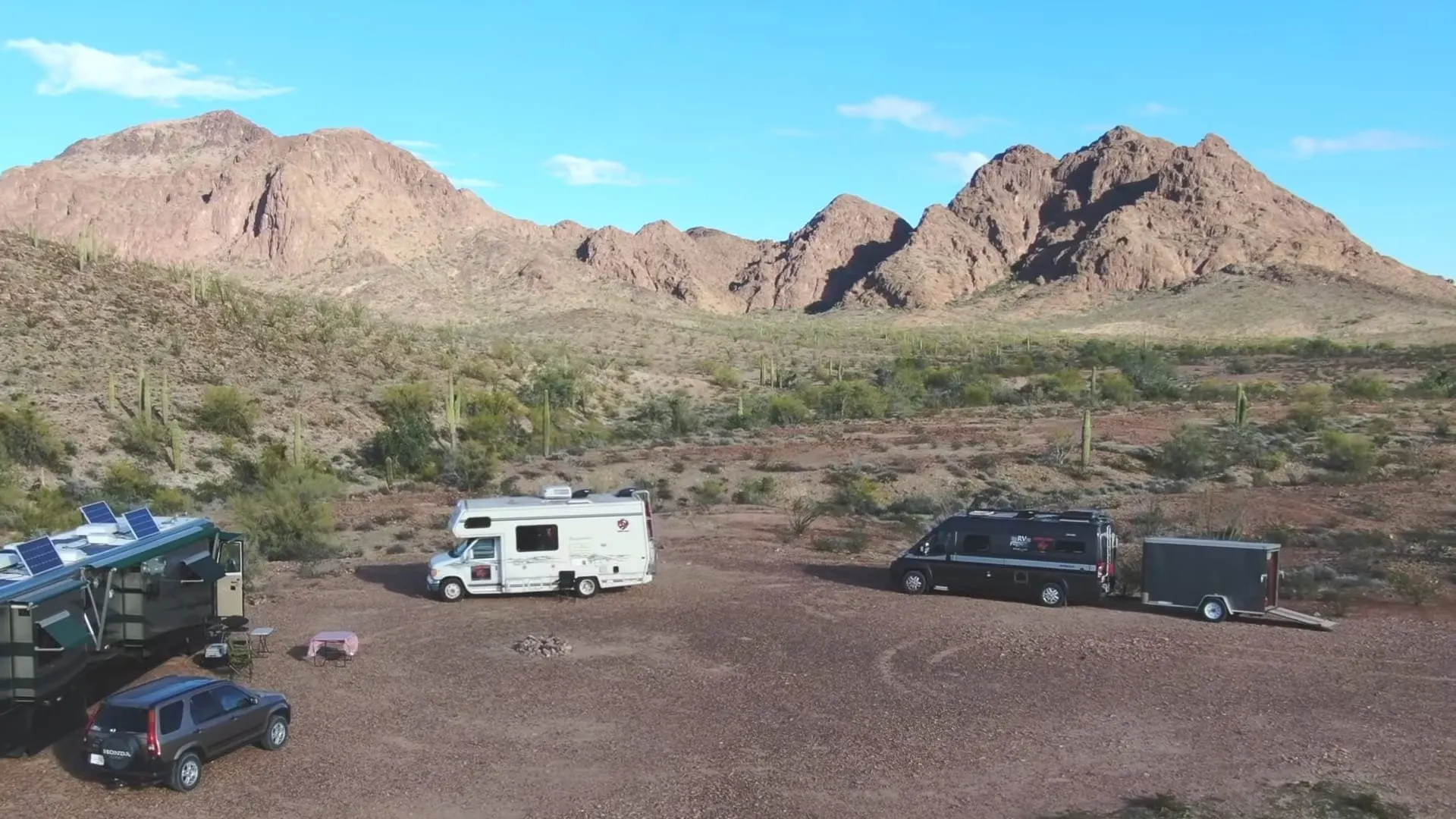
Traveling with a Class A RV and a toad is our favorite way to roll, but it’s not for everyone. What’s important is deciding what works best for you.
Chances are, you won’t need a class A RV license. However, if you have a big rig or you tow something, check your state’s guidelines. If your total vehicle weight exceeds 26,000 pounds, many states require a special license.
Before deciding to purchase a Class A RV, it’s a good idea to understand the kinds of regulations that will apply to you and your travel partner(s) as drivers of a big rig. For some travelers, smaller may be better as you’ll avoid the need to deal with special considerations like these and you may also be more comfortable on the road in general.
A Class A RV is a fantastic travel vehicle and our favorite way to go, but it’s not right for everyone. There’s much to consider when choosing the best RV for your lifestyle (including motorhome insurance cost). We hope this information is helpful to you as you choose your best travel rig and prepare to hit the road.
How To Drive A Class A Motorhome — Off-tracking & Rear Overhang
Geek Out with Us Every Week
Join our newsletter to learn about all things RV-related. Every week we offer free tips, tricks, product reviews, and more to our online community of RVers. Whether this is your first time on the road or you’re a seasoned expert, we’d love for you to geek out with us!

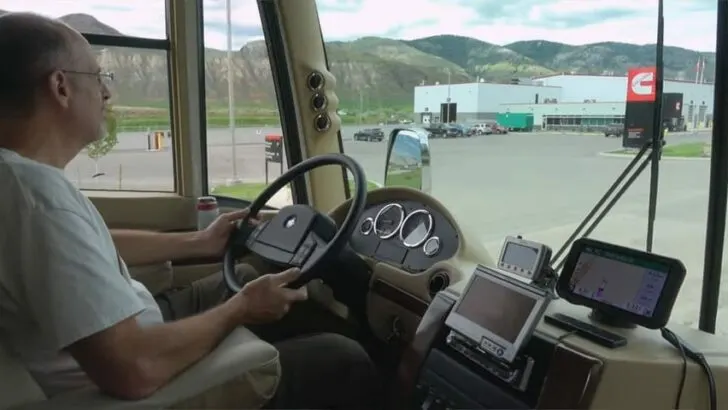
Tom
Sunday 14th of January 2024
As a former full time RV’er and current CDL-A driver, I do not understand why RV’er’s out on the road who clearly are over 26,001 lbs GVW don’t have the proper licenses and training. You can’t go out of your passenger car and jump into something that heavy (and long) and think you can safely motor down the road.
If you question if you shouldn’t need a special license, spend the time, get safe with training, and get your license. Especially if your weight is anywhere near 26.001 lbs or more (fully loaded with fuel and water)
Marc Goldstone
Wednesday 12th of October 2022
I am Domiciled and licensed (regular automobile license) in Arizona.I flat tow a 4000 pound Jeep with an RVI-3 braking system behind our Diesel Pusher. The RV's loaded weight is almost 26,000 pounds with a full 75 Gal. fresh water tank. The combined weight including the Jeep is nearly 30,000 pounds.
Is special licensing required in order for me to drive the rig in the 50 states?
Tom
Sunday 14th of January 2024
@Marc Goldstone,
Yes. Class B. Your combination weight is over 26,001 lbs
TheRVgeeks
Wednesday 12th of October 2022
Hi Marc. As long as you are legally licensed to drive your vehicle in your home state, you're legal in all other states. It's part of the reciprocity agreements between them. As far as we know, Arizona doesn't require any specific license class for driving an RV of any size, but to be 100% sure, we'd suggest you contact AZDOT to ask them, making it clear that you're driving a recreational vehicle, not a commercial one.
Douglas Polt
Monday 12th of April 2021
Keep in mind, if your state requires a CDL of NCDL and you do not get licensed accordingly there is a good chance your insurance will not cover you if you have an accident! Complying with the state requirement is cheap "insurance".
TheRVgeeks
Monday 12th of April 2021
Thanks for the great additional tip, Douglas!
Joe Eafrati
Monday 12th of April 2021
If your state does not require a CDL or NCDL, could the states do, stop you from driving through their state?
TheRVgeeks
Monday 12th of April 2021
Great question, Joe. Not currently. Reciprocity between states allows a driver that is legally licensed for a particular type of vehicle in their home state to drive in every state. That doesn't mean that couldn't change at some point, such as California talking about making a change that would require ANY vehicle driving through their state to meet California emission requirements. Not law at this point but that's the kind of thing that could conceivably happen at some point.
David
Sunday 11th of April 2021
Your article us incorrect regarding Texas and a CDL. Fir NON commercial (not for hire ) drivers of a Motorhome over 26000 lbs, a “ Class B exempt” license is all that is required. There is no CDL requirement for personal use, towing or not.
TheRVgeeks
Sunday 11th of April 2021
Hi David! We accidentally included Texas in two different categories. We've removed it from the "States That Require a Commercial Driver’s License" category, and left it in the "States That Require a Non-Commercial Special Driver’s License" category. Thanks for catching that.